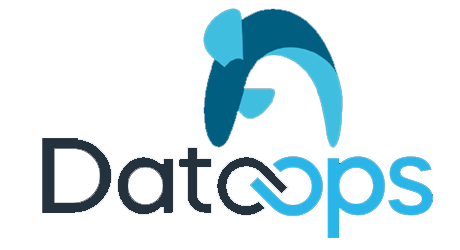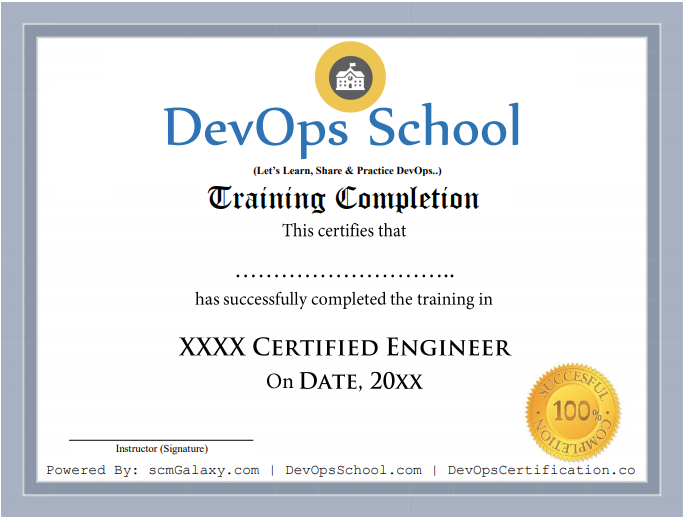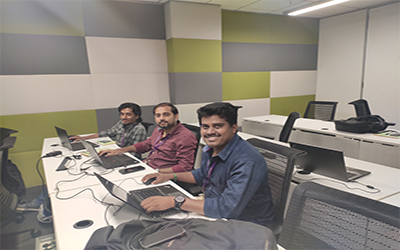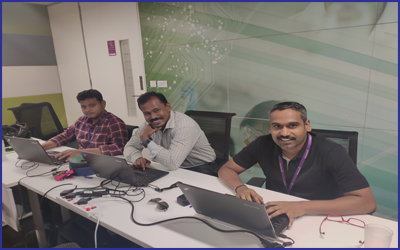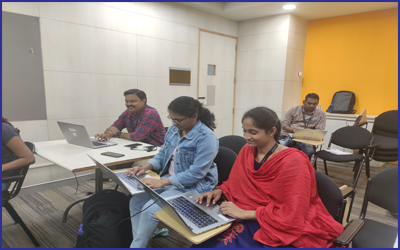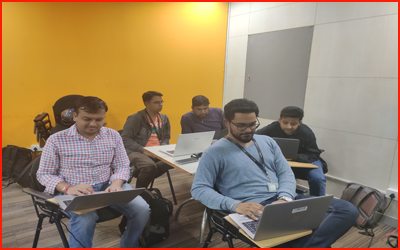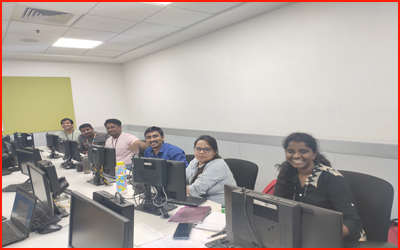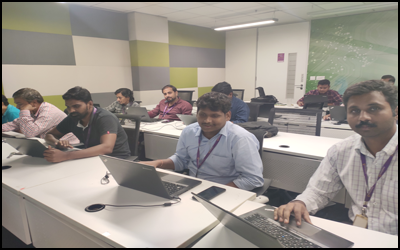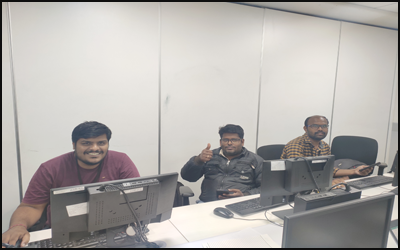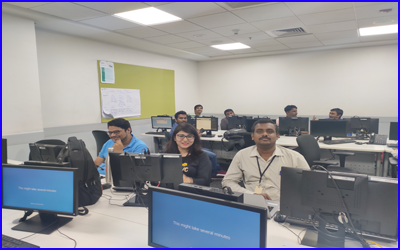DataOps Foundation Certification
Course Duration
5 Days
Live Projects
NA
Certification
Industry recognized
Training Format
8000+
Certified Learners
15+
Years Avg. faculty experience
40+
Happy Clients
4.5/5.0
Average class rating
What is DataOps Foundation Certification?
The DataOps Foundation Certification is an industry-recognized credential that provides professionals with the knowledge and skills required to implement and manage DataOps practices within organizations. DataOps is a modern approach to managing and automating data workflows, akin to DevOps for data engineering. It focuses on enhancing the speed, quality, and efficiency of data processes across the organization by integrating data management, data development, and data operations into a unified, collaborative framework.
The DataOps Foundation Certification is designed to help professionals understand the core principles of DataOps, including agile development practices, automation of data pipelines, data quality management, and continuous integration/continuous delivery (CI/CD) for data. The certification ensures that individuals are equipped to apply best practices in data operations to improve collaboration across data teams, streamline data workflows, and ensure that high-quality data is delivered rapidly to decision-makers.
In essence, the DataOps Foundation Certification empowers data professionals to enhance data quality, accelerate data delivery, and optimize the management of data systems and processes across the data lifecycle.
Why DataOps Foundation Certification is important
With increasing reliance on cloud technologies and agile development processes, security has become a top priority for organizations. Traditional software development and operations approaches often resulted in security being treated as a separate entity — handled after the development phase or as a separate part of operations. However, as threats evolve, so must the practices used to mitigate these risks. The DevSecOps Foundation Certification is critical for several reasons:
-
Security Integration Across the SDLC: DevSecOps ensures that security is not an afterthought but a fundamental part of the development lifecycle. This integration allows for the early detection of security vulnerabilities, reducing the chances of costly security breaches or system downtime. As organizations increasingly migrate to cloud infrastructures, integrating security directly into DevOps ensures that vulnerabilities are addressed as soon as they arise, improving overall software quality and security.
-
Increasing Frequency and Complexity of Attacks: With the rise of sophisticated cyberattacks and data breaches, especially in the cloud environment, organizations cannot afford to delay implementing security practices. DevSecOps helps prevent attacks by continuously monitoring systems, conducting automated security testing, and responding swiftly to vulnerabilities and incidents. This proactive approach helps organizations identify and mitigate security risks before they become significant issues.
-
Growing Demand for Secure Development Practices: As cyber threats become more complex, industries such as finance, healthcare, and government face greater regulatory pressure. Security breaches can lead to severe financial and reputational damage. The DevSecOps Foundation Certification ensures that professionals are well-versed in industry standards for secure development, such as encryption protocols, identity management, compliance, and secure coding practices, making them indispensable in helping organizations stay compliant with relevant regulations.
-
Career Development: DevSecOps has become a highly sought-after skill in the IT industry, with job opportunities growing in tandem with the increase in cloud adoption and agile development practices. Professionals with this certification are in high demand, as businesses look for individuals capable of integrating security into DevOps pipelines, ensuring that applications are both agile and secure. Earning the certification helps professionals stand out and advance their careers, opening doors to roles such as DevSecOps Engineer, Cloud Security Architect, or Security Engineer.
-
Cost-Effective and Risk-Reducing: By catching security vulnerabilities early in the development process, organizations can avoid the high costs associated with post-deployment fixes, security patches, or data breaches. DevSecOps encourages automation of security tasks, which not only saves time but also ensures consistent application of security policies, reducing the risk of human error in security management.
-
Compliance with Industry Standards: The DevSecOps Foundation Certification aligns with many industry standards and frameworks, such as ISO/IEC 27001, NIST Cybersecurity Framework, and PCI-DSS. These frameworks provide clear guidelines for managing cybersecurity risks and securing applications. By adopting DevSecOps practices, organizations can ensure that they comply with regulations while maintaining efficient development and delivery pipelines.
Course Feature
The DevSecOps Foundation Certification Course offers an in-depth look at the core principles of integrating security into the DevOps process. The course is structured to provide both theoretical knowledge and practical, hands-on experience. Here are some key features of the course:
-
Comprehensive Coverage: The course is designed to give learners a comprehensive understanding of DevSecOps practices, focusing on secure software development, automated security testing, continuous integration, incident response, and vulnerability management. The curriculum is divided into modules that cover every aspect of DevSecOps, ensuring a complete understanding of the integrated approach to security.
-
Real-World Practical Experience: Unlike many theoretical courses, this certification provides hands-on labs and exercises, allowing participants to apply what they learn in real-world scenarios. Learners will use tools such as Jenkins, Docker, Kubernetes, OWASP ZAP, and SonarQube to implement automated security testing, vulnerability scans, and continuous security monitoring within a DevOps pipeline.
-
Industry-Relevant Tools and Technologies: The course provides exposure to the latest DevSecOps tools and technologies. Participants will learn to integrate security scanning tools, such as SAST (Static Application Security Testing), DAST (Dynamic Application Security Testing), and SCA (Software Composition Analysis), into their CI/CD pipeline to ensure comprehensive security coverage across the development lifecycle.
-
Instructor-Led Training: Experienced instructors with extensive DevSecOps and cybersecurity backgrounds lead the course. These instructors provide deep insights into how DevSecOps is applied in modern IT environments, offering participants the opportunity to engage in discussions and learn from real-world case studies.
-
Modular Structure and Flexible Learning: The course is broken down into digestible modules that participants can complete at their own pace. Whether in a traditional classroom setting or through an online self-paced option, participants can access video lessons, reading materials, and practice exams whenever and wherever they want.
-
Certification Exam Preparation: The course includes mock exams, quizzes, and sample questions that help participants prepare for the DevSecOps Foundation Certification exam. These practice exams simulate the real exam environment, ensuring that learners are fully prepared to pass on their first attempt.
-
Lifetime Access to Course Materials: After completion of the course, participants receive lifetime access to all course materials, updates, and new content. This access allows professionals to refresh their knowledge or dive deeper into specific topics as they advance in their careers.
Training objectives
The DevSecOps Foundation Certification Course is designed with specific training objectives that help participants develop a strong foundation in integrating security into DevOps. These objectives include:
-
Understanding the DevSecOps Framework: Participants will gain a solid understanding of the DevSecOps lifecycle, from planning and development to testing, deployment, and monitoring. They will learn how security fits into each stage and the tools and practices used to automate security within the CI/CD pipeline.
-
Secure Software Development: The course focuses on how to integrate security into the software development lifecycle by adopting secure coding practices and ensuring that security vulnerabilities are detected and addressed early. Participants will also learn about threat modeling and the identification of security risks before they become exploitable.
-
Automated Security Testing: Participants will learn how to integrate automated security testing tools into their CI/CD pipelines. They will understand the value of continuous security testing, including the use of tools like OWASP ZAP and SonarQube, to detect vulnerabilities at an early stage.
-
Vulnerability Management: The course covers methods for identifying, prioritizing, and mitigating security vulnerabilities across development, staging, and production environments. This includes managing dependencies, updating libraries, and handling known vulnerabilities with SCA tools.
-
Compliance and Governance: Participants will learn how to ensure that DevOps practices align with industry standards and regulatory frameworks such as GDPR, HIPAA, and PCI-DSS. The course will teach how to embed compliance checks into automated pipelines to ensure consistent enforcement of security policies.
-
Incident Response and Monitoring: The course will teach participants how to continuously monitor the system for security events, set up automated alerts, and respond to incidents in a timely manner. This includes the use of security monitoring tools and automated incident response workflows.
-
Collaboration Between Development, Security, and Operations: A key objective of the DevSecOps approach is to foster collaboration among development, security, and operations teams. Participants will learn how to break down silos and ensure that all teams work together to build secure software.
Target Audience
The DevSecOps Foundation Certification is designed for professionals who want to understand how security integrates with DevOps processes. The target audience includes:
-
DevOps Engineers: Professionals working in DevOps who want to gain a deeper understanding of how to incorporate security into their DevOps practices.
-
Security Engineers: Cybersecurity professionals who want to learn how to work with DevOps teams to ensure that security is embedded throughout the development lifecycle.
-
Software Developers: Developers who want to learn how to write secure code and ensure that their applications meet security requirements from the start.
-
IT Operations Professionals: IT professionals working in operations who are responsible for managing cloud environments and applications and need to understand how to secure these systems.
-
Cloud Engineers: Cloud professionals who want to ensure that their cloud infrastructure is secure by integrating DevSecOps practices into their cloud environments.
-
Compliance and Risk Managers: Professionals in charge of ensuring that their organizations comply with regulatory standards and who need to understand how to embed compliance checks into the DevOps process.
-
Aspiring DevSecOps Professionals: Individuals looking to transition into a DevSecOps role or those interested in learning about secure development practices within a DevOps pipeline.
Training Methodology
The DevSecOps Foundation Certification course utilizes a variety of training methods to ensure that participants acquire both the theoretical knowledge and practical skills necessary for successful implementation of DevSecOps in real-world environments. The training methodology includes:
-
Instructor-Led Training: Experts in the field of DevSecOps lead training sessions, providing personalized instruction, answering questions, and guiding participants through complex concepts.
-
Hands-On Labs: Interactive labs allow participants to work with actual DevSecOps tools, providing practical experience in integrating security into the DevOps pipeline. This hands-on approach solidifies learning and helps participants develop the necessary skills to apply the concepts.
-
Case Studies and Scenarios: Real-world case studies and simulations demonstrate how DevSecOps is applied in industry settings, providing context and reinforcing theoretical learning.
-
Self-Paced Learning: For flexibility, the course offers online modules and videos that participants can access and complete at their own pace, allowing them to balance work and study.
Training Materials
To facilitate the learning process, the DevSecOps Foundation Certification Course includes comprehensive training materials such as:
-
Courseware: Detailed slides, notes, and documentation that cover all key concepts in DevSecOps.
-
Tool Access: Participants gain access to industry-standard tools used in DevSecOps processes, including Jenkins, GitLab, Docker, Kubernetes, SonarQube, and OWASP ZAP.
-
Practice Quizzes and Mock Exams: These tools help participants test their knowledge throughout the course and prepare for the certification exam.
-
Supplementary Materials: Additional reading materials, e-books, and articles that delve deeper into DevSecOps concepts and tools.
-
Instructor Support: Continuous access to instructors for clarification of doubts and additional guidance on difficult topics.
Instructor-led, Live & Interactive Sessions
DURATION |
MODE |
LEVEL |
BATCHES |
COURSE PRICE AT |
|---|---|---|---|---|
5 Days |
Corporate (Online/Classroom) |
DataOps Foundation Certification |
Corporate Batch |
Contact US |
How to contact DevOpsSchool :
+1 (469) 756-6329
Contact@DevopsSchool.com
DevopsSchool.com
+91 99057 40781
AGENDA : DATAOPS FOUNDATION CERTIFICATION Download Curriculum
SL |
Method of Training and Assesement |
% of Weightage |
|---|---|---|
1 |
Understanding the problems |
5% |
2 |
Concept Discussion |
10% |
3 |
Demo |
25% |
4 |
Lab & Exercise |
50% |
5 |
Assessments & Projects |
10% |
OUR COURSE IN COMPARISON
| FEATURES | DEVOPSSCHOOL | OTHERS |
|---|---|---|
| Lifetime Technical Support | ||
| Lifetime LMS access | ||
| Interview-kit | ||
| Step by Step Web Based Tutorials | ||
| Training Slides |
- Students should have Adobe Photoshop installed on their computers to follow along.
- You are a video creator
- You might know how to edit with Final Cut, iMovie, Sony Vegas, Premiere Elements, Windows Movie Maker, Camtasia, Screenflow, etc. But you want to transition to editing with Photoshop.
- You are a complete beginner who has never opened Photoshop
- You have played around with Photoshop, but need some help becoming a more efficient editor.
Weekdays - Live Class Schedule
| Day | IST (India) | PST (USA) | EST (USA) | CET (Europe) | JST (East Asia) |
|---|---|---|---|---|---|
| Monday | 9:00 PM - 11:00 PM | 7:30 AM - 9:30 AM | 10:30 AM - 12:30 PM | 4:30 PM - 6:30 PM | 12:30 AM - 2:30 AM (Tuesday) |
| Tuesday | 9:00 PM - 11:00 PM | 7:30 AM - 9:30 AM | 10:30 AM - 12:30 PM | 4:30 PM - 6:30 PM | 12:30 AM - 2:30 AM (Wednesday) |
| Wednesday | 9:00 PM - 11:00 PM | 7:30 AM - 9:30 AM | 10:30 AM - 12:30 PM | 4:30 PM - 6:30 PM | 12:30 AM - 2:30 AM (Thursday) |
| Thursday | 9:00 PM - 11:00 PM | 7:30 AM - 9:30 AM | 10:30 AM - 12:30 PM | 4:30 PM - 6:30 PM | 12:30 AM - 2:30 AM (Friday) |
Weekends - Live Class Schedule
| Day | IST (India) | PST (USA) | EST (USA) | CET (Europe) | JST (Asia) |
|---|---|---|---|---|---|
| Friday | 9:00 AM - 11:00 AM | 7:30 PM - 9:30 PM (Thursday) | 10:30 PM - 12:30 AM (Thursday/Friday) | 4:30 AM - 6:30 AM (Friday) | 1:30 PM - 3:30 PM (Friday) |
| Saturday | 9:00 AM - 11:00 AM | 7:30 PM - 9:30 PM (Friday) | 10:30 PM - 12:30 AM (Friday/Saturday) | 4:30 AM - 6:30 AM (Saturday) | 1:30 PM - 3:30 PM (Saturday) |
| Sunday | 9:00 AM - 11:00 AM | 7:30 PM - 9:30 PM (Saturday) | 10:30 PM - 12:30 AM (Saturday/Sunday) | 4:30 AM - 6:30 AM (Sunday) | 1:30 PM - 3:30 PM (Sunday) |
DATAOPS CERTIFICATION
What are the benefits of DataOps Foundation Certification?
Certifications always play an important role in any profession. It is considered as one of the best way to determine one’s credibility and worth in the professional career. The same thing is applicable in DevOps, if you are a certified SRE professional then you will get certain benefits:
- DataOps Foundation Certification assure recruiters that the SRE professional whom we are going to hire have the skills, knowledge, and competency to perform the responsibilities what expected from them after hiring.
- SRE as a technology is dominating the job market. SRE engineer ranks #2 on Glassdoor's best jobs rankings. The role of SRE certified professional has seen a 200% jump in postings on indeed" according to SD times report
- This certified course helps anyone who aspires to make a career as a SRE professional.
- SRE Certified Engineer is one of the most highly paid job roles in the world. Pay scale even for junior level SRE practitioner is quite high.
- According to indeed and other job portals, 80% of the companies pay more than $90000 starting salary to a SRE Certified Professionals. Also, 35% pay at least $115000 and 17% more than $125000
- Obviously there are several factors which affects salary for like geography, skills, company, it varies accordingly. In Cities like Bangalore/Hyderabad SRE Certified Professional can expect - INR 3,25,672 - 19,42,394 which is not at all a bad package.
- SRE is going to stay here for long time. Therefore organizations and as well as professionals need to change as they have no choice but to evolve. If they will evolve then then demands of certified professionals will definitely increase and the sooner you do it, the sooner you will be in a leading position.
View more
FREQUENTLY ASKED QUESTIONS
After the training each participant will get LIFETIME ACCESS of our Learning Management System (LMS) where you will get materials in the form of Class recordings, Notes, PDF slides, Web reference step by step guide, questions and answers, test module, exercise and sample projects.
Yes, All of our training demo and lab would be done in AWS cloud platform where we can save lots of time for setting up the infrastructure for demo and lab. Our trainer also designed the course for quick learning and grasping method.
Yes, Snacks and Lunch would be served at training venue free of cost from our end.
Yes, we have DevOpsSchool forum. After the training you may post your issues and Instructors would reply you within 24 hours.
After successful completion of our SRE workshop in Bangalore, every participants would be awarded with SRE certificates approved by DevOpsSchool and DevOpsCertification.co Certification program which is industry recognized and does holds high value.
Once you make the payment based on the given instructions, you will receive the joining KIT within 12 hours.
ONLINE TRAINING REVIEWS

Abhinav Gupta, Pune
(5.0)The training was very useful and interactive. Rajesh helped develop the confidence of all.

Indrayani, India
(5.0)Rajesh is very good trainer. Rajesh was able to resolve our queries and question effectively. We really liked the hands-on examples covered during this training program.

Ravi Daur , Noida
(5.0)Good training session about basic SRE concepts. Working session were also good, howeverproper query resolution was sometimes missed, maybe due to time constraint.

Sumit Kulkarni, Software Engineer
(5.0)Very well organized training, helped a lot to understand the SRE concept and detailed related to various tools.Very helpful

Vinayakumar, Project Manager, Bangalore
(5.0)Thanks Rajesh, Training was good, Appreciate the knowledge you poses and displayed in the training.

Abhinav Gupta, Pune
(5.0)The training with DevOpsSchool was a good experience. Rajesh was very helping and clear with concepts. The only suggestion is to improve the course content.
